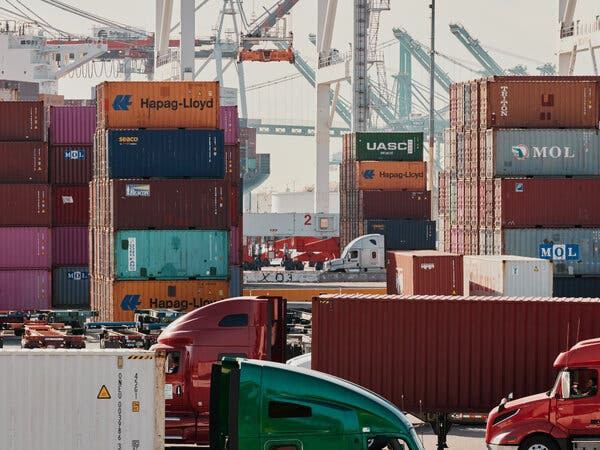Could Tariffs Replace Income Taxes? Examining Trump's Claims

Table of Contents
The Economic Theory Behind Tariff Revenue
The basic concept is straightforward: tariffs, taxes on imported goods, generate revenue for the government. Historically, many nations, including the United States during its early years, relied heavily on tariffs as a primary source of government funding. However, the complexities of modern economies render this a vastly oversimplified view.
- Advantages of Tariff Revenue: Tariffs offer apparent simplicity in implementation and can be targeted to specific industries, potentially protecting domestic producers.
- Disadvantages of Tariff Revenue: The primary drawback is the potential for retaliatory tariffs from other countries, leading to trade wars that harm all participants. Furthermore, tariffs are generally considered regressive, disproportionately affecting lower-income individuals who spend a larger portion of their income on imported goods. The effectiveness of tariffs is also heavily dependent on a nation's import/export balance – a large trade deficit significantly limits the potential revenue.
- Optimal Tariff Rates and Economic Efficiency: Economic theory suggests an "optimal tariff" exists, maximizing government revenue without causing excessive distortions in trade. However, determining this optimal rate is incredibly complex and depends on numerous factors, making it a highly debated topic among economists.
Relying solely on tariffs for government funding in a modern, complex economy is impractical. The revenue generated would be highly volatile, susceptible to fluctuations in global trade and susceptible to political manipulation. Furthermore, it would severely limit a government’s ability to implement progressive tax policies aimed at reducing income inequality.
Trump's Stance on Tariffs and Income Taxes
Trump's economic policy frequently employed tariffs as a key instrument, imposing significant duties on steel, aluminum, and goods from China. While he advocated for substantial income tax cuts, his statements regarding the potential of tariffs to replace this lost revenue remained inconsistent and lacked concrete economic justification.
- Specific Examples of Trump's Tariff Policies: The steel and aluminum tariffs, along with the trade war with China, are prime examples of his tariff-heavy approach.
- Economic Impact Analysis: These policies resulted in increased prices for consumers, job losses in some sectors, and retaliatory tariffs from other nations. The revenue generated fell significantly short of the projected revenue loss from income tax cuts.
- Political Motivations: His tariff policies were often driven by protectionist sentiments and aimed at boosting domestic industries, even at the expense of overall economic efficiency and international trade relationships.
Trump's rhetoric on replacing income taxes with tariffs was largely inconsistent, serving more as a political tactic than a well-reasoned economic plan.
The Practical Challenges of a Tariff-Only System
Replacing a comprehensive income tax system with tariffs presents insurmountable challenges. The complexity of the current income tax structure, with its deductions, credits, and varying brackets, is far beyond the simplicity of a tariff system.
- Impact on Different Income Groups: A tariff-only system would disproportionately burden lower and middle-income families, exacerbating income inequality.
- Effects on Domestic Industries and International Trade: Such a system would disrupt domestic industries, leading to job losses in some sectors and potentially harming international trade relations.
- Potential for Inflation and Reduced Consumer Spending: Increased prices on imported goods due to tariffs could lead to inflation and reduced consumer spending, ultimately hindering economic growth.
A balanced and diversified revenue system is crucial for a stable and prosperous economy. Progressive taxation plays a vital role in mitigating income inequality and funding essential public services. A tariff-only system simply wouldn't provide the flexibility or revenue stability required for effective governance.
Alternative Revenue Generation Strategies
Numerous alternative approaches to government funding exist, offering potentially more equitable and stable revenue streams than tariffs alone.
- Value-Added Tax (VAT): A consumption tax levied at each stage of production, VAT is widely used globally and offers broad-based revenue generation.
- Carbon Tax: A tax on carbon emissions aims to address climate change while generating revenue.
- Wealth Tax: A tax on an individual's net worth could address wealth inequality and generate significant revenue from high-net-worth individuals.
- Other Potential Revenue Streams: Land value taxes, financial transaction taxes, and increased corporate tax rates are other options worthy of consideration.
Each of these strategies carries its own set of advantages and disadvantages, and a careful analysis of their economic implications is essential before implementation.
Re-evaluating the Viability of Replacing Income Taxes with Tariffs
The analysis clearly demonstrates the significant practical and economic challenges of replacing income taxes with tariffs. The revenue generated by tariffs is inherently limited, volatile, and regressive. A tariff-only system would severely destabilize the economy, harming international trade relationships, and exacerbating income inequality. A balanced and diversified approach to government funding, incorporating progressive taxation alongside other revenue streams, remains essential for economic stability and social equity.
We urge readers to further investigate the topic of tariff reform and alternative revenue generation models. Critically evaluate proposals like those suggesting that tariffs could replace income taxes, and explore the nuances of diverse fiscal policies. For further information, consult resources like the Congressional Budget Office and the Tax Policy Center. Understanding these complexities is crucial for informed civic engagement and the development of sound economic policy.

Featured Posts
-
 Michael Sheens 1 Million Giveaway How To Participate
May 01, 2025
Michael Sheens 1 Million Giveaway How To Participate
May 01, 2025 -
 France Dominates Italy Ireland On Six Nations Notice
May 01, 2025
France Dominates Italy Ireland On Six Nations Notice
May 01, 2025 -
 Une Boulangerie Normande Recompense Le Premier Bebe De L Annee Avec Du Chocolat
May 01, 2025
Une Boulangerie Normande Recompense Le Premier Bebe De L Annee Avec Du Chocolat
May 01, 2025 -
 Goedkoop Elektrisch Rijden In Noord Nederland Met Enexis Buiten De Piek
May 01, 2025
Goedkoop Elektrisch Rijden In Noord Nederland Met Enexis Buiten De Piek
May 01, 2025 -
 Splice A Deep Dive Into Cay Fests Filmmaking
May 01, 2025
Splice A Deep Dive Into Cay Fests Filmmaking
May 01, 2025
Latest Posts
-
 Key Facts About Wayne Gretzky A Concise Overview
May 01, 2025
Key Facts About Wayne Gretzky A Concise Overview
May 01, 2025 -
 Essential Wayne Gretzky Fast Facts Stats Records And More
May 01, 2025
Essential Wayne Gretzky Fast Facts Stats Records And More
May 01, 2025 -
 Wayne Gretzkys Fast Facts A Quick Look At The Great Ones Career
May 01, 2025
Wayne Gretzkys Fast Facts A Quick Look At The Great Ones Career
May 01, 2025 -
 Game 4 Johnstons Fastest Playoff Goal Leads Stars To 6 2 Win Over Avalanche
May 01, 2025
Game 4 Johnstons Fastest Playoff Goal Leads Stars To 6 2 Win Over Avalanche
May 01, 2025 -
 Stars Take 3 2 Series Lead With Johnstons Speedy Playoff Goal
May 01, 2025
Stars Take 3 2 Series Lead With Johnstons Speedy Playoff Goal
May 01, 2025
